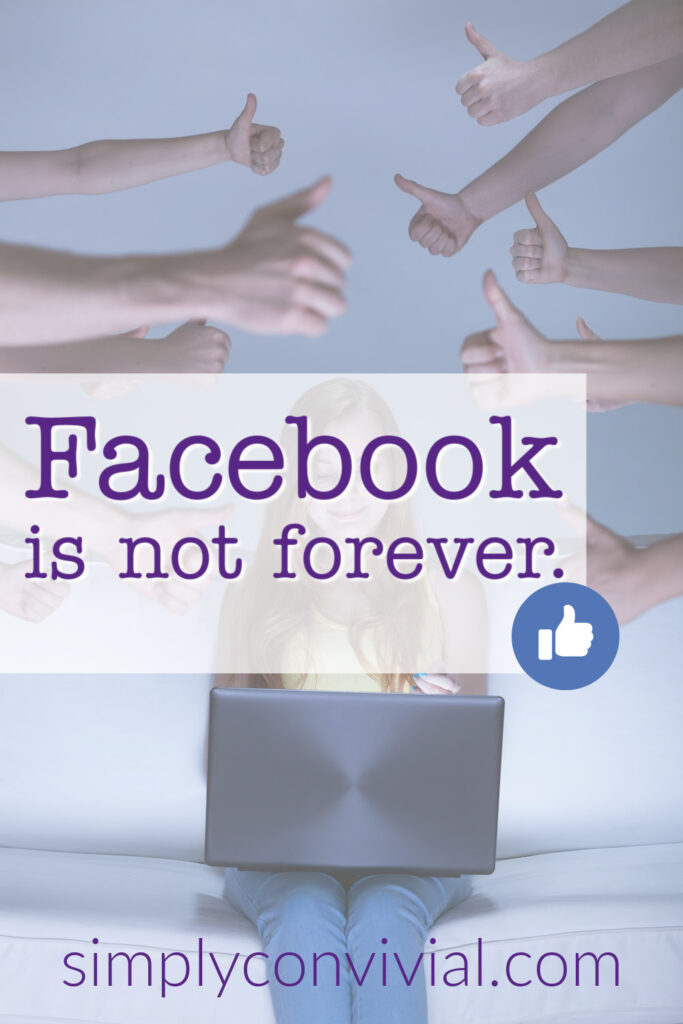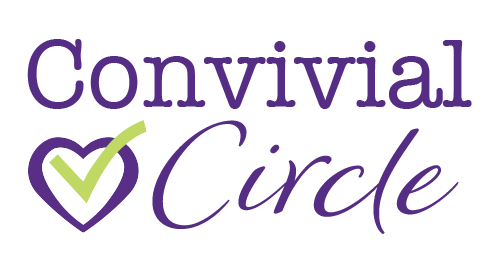
Facebook is not forever
Or, what we really want out of social media.
Although Americans want to believe it, and manipulate to contrive it, there actually is no such thing as “too big to fail.” History shows us rather the opposite. At a certain point, human entities and institutions can become too big not to fail.
Human institutions with Babel-like aspirations are doomed to bring more confusion, not more unity, to human relationships.
Even were there not idolatry and overweening pride involved, the nature of technology and innovation is to become obsolete as capabilities increase and as users adopt and adapt to the tech.
Technologies’ Promises
Back in the early 2000s, I had a PDA I really tried to make useful, but gave up on. Such devices don’t exist anymore because smartphones delivered on the promise of the PDA – with so much more.
So it goes with many other piloted and innovated technologies. Before Facebook, there was MySpace, forums, bulletin boards. The initial efforts demonstrated there was potential, but the first attempts created more desire than they satisfied.
Enter Facebook. How and why Facebook became THE social platform is a drama for another storyteller. The reality today is that Facebook has had the staying power no other platform has had because of the massive user base.
The users are the value Facebook offers. If our friends or relations or favorite group weren’t there, we wouldn’t be there. If the users weren’t there, Facebook wouldn’t make money on ads.
Facebook continues on by inertia. The whole reason to be on Facebook is that “everyone” is on Facebook. What makes competitors less appealing and less functional is that “everyone” is *not* on their platforms.

Products v. Customers
But user bases change. Social dynamics and desires change. And the whole premise of Facebook is susceptible to crumbling should it no longer serve.
Serve what? Facebook doesn’t really serve its users at all, so Facebook remains aloof from what – that is, who – actually makes it valuable at all. Facebook doesn’t make revenue from its users, but from advertisers – users are the value, not the customer.
The fewer people use Facebook – and any of its other platforms – the less valuable Facebook is — not only for other users but also for Facebook – because Facebook makes money on advertising.
When you don’t pay for a product, you are the product. We are used to being prostituted for our eyeballs and attention. We would rather be distracted and manipulated by “the powers that be” – the wizard behind the curtain making back room deals – than pay for services and entertainment we receive.
Even business models that allow for users to pay in order to remove ads set up a weird value proposition. It’s almost as if we’re paying for the favor of not being distracted, but we’re still not becoming the primary customer of the platform.
Follow the money
“Follow the money” is always good advice, because advertisers exert invisible pressure on content and business decisions that those paying for the privilege of not seeing the ads will never have.
Both Simply Convivial and Schole Sisters – on the blogs, on the podcasts, and inside our communities – actively and intentionally turn down sponsorships and advertisements. We know whom we serve and we’re not going to sell out their ears or eyeballs to the highest bidder, not on the podcasts, not on our websites. We have a no-ad stance.
We’re not going to interrupt what we have to say, giving someone else’s sales pitch the prime spot. We want every moment in a blog post or podcast to be meaningful, not distracting and jumpy.
We want relationships with our people, not with big companies who want want to make our listeners their own.
An economy works best when everyone overdelivers to their customers. The smartphone overdelivered on the promise of the PDA. Facebook overdelivers to its customers – its advertisers – by giving targeted data across the web never before possible.
It routinely abuses its users because its users aren’t its customers. Users’ data is their product, those who purchase the data and eyeball-time are the customers – and in any successful business, the customers are always right.
So it behooves any business to be careful who their customers are. It behooves any user of a service to inquire whose interest is actually being served.
Facebook FOMO
Over the last several years the online ecosystem has started to shake and the tremors continue. Monolith platforms might not be able to deliver on what people desire anymore.
Everyone talks about the fear of missing out as a real, but bad reason to do something. Yet, as far as I can tell, that’s the only reason anyone I’ve talked to for the last several years is on Facebook. No one likes it, but they feel some pressure or other to be on, because otherwise they’d miss something.
Eventually, FOMO will lose its grip, giving way to other fears. Perhaps fear might give way to a positive desire for something actually good and beneficial and not just massive and convenient.
Attracting users – who are only data to be mined in Facebook’s ecosystem – by FOMO will not work forever. Perhaps soon, missing out on what the algorithm features will be exactly what everyone wants.
Markets change. People’s needs change. No tech product is forever. No brand is forever.
Perspective from an internet dinosaur
I used the internet before most people. My dad was an early adopter who one day brought home html code instructions, printed on a thick stack of still-connected dot-matrix printer paper. He plopped it on the table for my brother and I and said, “If you learn this, you can make web pages.” And so we did.
At the time, others thought AOL *was* the internet. They assumed our webpages were on MySpace. Maybe we should have changed the background to not be repeating galaxies, but that just seemed to be what the internet should look like at the time.
We used Altavista to search the web before Google existed, before very much existed on the internet at all. Altavista was so cool, so powerful, so great to use – until it wasn’t. Until Google delivered better search results, hands down.
It could get messy to disentangle these behemoth tech companies from our lives, but it might just be the worthwhile mess on the way to decluttering and organizing and deciding for ourselves – without algorithms – who we want to connect with and how we want to do it.
I have learned that drama is not inherent within social media. It is inherent within the Facebook and X platforms because it’s what the platforms favor because it keeps people engaged more and on longer.
Facebook favors and rewards combativeness, and so people are combative – either to get the favor or because it’s what everyone else is doing, so a response in kind seems fitting.
Instagram favors and rewards emotiveness, drama of a different sort than Facebook, but drama nonetheless. It therefore not only attracts catty and manipulative people, but it encourages such behavior.
When people are sad or scared, they are more primed to buy. So sad and scared users are more valuable to Facebook and Instagram, so they do what they can to make their product – the users – more valuable to their customers – the advertisers. (PS – this phenomenon is documented many places, but the most recent place I heard it was in the book Attention Span by Gloria Mark.)
It’s business, but it’s a terrible business model that we don’t have to participate in.
Social media doesn’t have to be that way at all.
Social media alternatives
I’ve been having conversations lately with my team at Convivial Circle, with my partners at Scholé Sisters, and also other members in our community about how startlingly, shockingly amazing our communities are.
The Scholé Sisters community is free, yet in four years of running it – never on Facebook – I think we’ve banned one person (a man – it’s a group for moms to talk shop, no mixed company) and moderated maybe 2 or 3 comments.
There have been threads we’ve watched carefully, but it turns out that women are starving for actual civil, intelligent conversation about things that matter – and we have succeeded in making a place where that can happen. Quite honestly, it’s thrilling.
It’s also expensive, but many of our users enjoy the platform so much that they want more, and so upgrade – which allows us to maintain a free discussion space. It’s what you wish your homeschool Facebook groups would be – but they’re not. It’s not because it’s not possible. It’s because the platform itself is working against the desire that the true user base – homeschool moms – has.
It’s less surprising that we’ve never had to ban users on Convivial Circle, since there is no free area. However, we do reserve the right to moderate or remove bad advice, including anything disrespectful of husbands, and yet that’s only happened a couple times in years of daily conversations and chit chat.
We have high standards, but we just live them alongside one another, we don’t have to read the riot act to an unruly mob at all. It’s a community where women who resonate with those standards. They come with the desire to overcome overwhelm and perfectionism without having their emotions catered to – and it’s not just the courses that help with that. It is the camaraderie and community that has formed around those desires that becomes the rising tide lifting all of us who participate.
One of our members has called our community – not the courses, but the actual social media angle of our community – “shockingly helpful.” I’ve been recording podcast episodes with members these last two weeks and all of them share how it is not the information they get in the courses, but the support and encouragement they get from other members, the camaraderie they get by having people to “talk shop” with makes the difference.
They see real love and genuineness without emotional goo, with a backbone of doing the work God has put before each one of us, and they get the cheerful kick in the pants wakeup call they needed to do the same, be the same, in their own homes and communities.
The effects of social media
Sure, you can dismiss all this as a sales pitch if you want, but here’s the truth: The women in both these groups are amazing and inspiring and I absolutely love my part in making the groups possible.
When I would spend time on Instagram, I would walk away with a sense that everything is fake, so many are catty, and here I am, a lone voice of sanity in a sad, sad world. It’s not that any of that isn’t actually true.
It is a sad, sad world. But being sapped of our emotional vitality and hope for progress and change is not good for our families or communities – and that’s what was (and is) happening on the large, manipulated, data-mining-for-advertiser social media platforms.
Instead, I can spend time with women who care about and who want to do better at maintaining their homes. I can spend time with women who read books and educate their own kids. I can spend time with women who are learning and growing rather than complaining. It’s like spending time in the sunshine rather than in the fog.
I no longer say that “I’m not on social media.” Facebook actually isn’t the entire definition of social media. I’m not on Big-Tech social media, but I absolutely adore my “bespoke,” private, non-data-mining, without-advertising social media platforms.
Social media is possible to exist without drama, without trolls, without outrage, without a lot of photos and visuals. I can prove it. I run two such social media platforms.
What’s the point of social media?
What do we really want out of social media anyway? Connection with likeminded people on topics that matter. I don’t think that happens on the major platforms. I call the bluff that they are delivering on that desire.
We also want connection with our family and friends, but does that seriously happen on Facebook, really? Wouldn’t it be better to just text them? A family group chat – in my experience – is so much better than seeing siblings’ Facebook posts. After all, in a private chat they can post pictures they might not share with the whole world *and* we can have our sibling banter only with people who get it.
FOMO truly is a bad reason to be a part of anything. It’s manipulative. Social media is possible without ads, without FOMO, without drama.
Ever since that day my dad told me I could make my own webpages, I’ve been intrigued with doing cool things on the internet. Before I had a legit business, before most people understood that content on the internet could be a business, that’s what I would say endeavors were: “I do cool things with the internet.”
Let’s get more creative and use the internet to do cool things rather than be passive recipients of whatever the behemoth companies decide to dish.
The internet is an amazing tool of connection, but we should be intentional about who it connects us with, why we’re connected, and what we do with those connections.
Find homemaking community!

- Get gospel-focused advice and encouragement.
- Level up your plans and progress, one step at a time.
- Find accountability with likeminded women without any social media drama.
- Experience the homemaking mentoring you’ve always wanted.
- Learn to love being a homemaker!
The direction & accountability homemakers need to make noticeable progress in their home management skills.
Just $27.99/month
(or save with a quarterly or annual plan)



